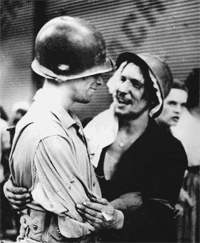Topics: History / Philosophy
01.02.2005
 We are publishing unique archive photographs from the collection of Georges
Romant. These photographs have never previously been published.
We are publishing unique archive photographs from the collection of Georges
Romant. These photographs have never previously been published.
George Romant was born in 1884 in the town of Fren-saur-Lescaulto in northern
France. Orphaned as a child, he was raised by adoptive parents in Forge-le-Ben.
At 16 he entered into college named after Delambert and acquired the profession
of furniture maker. He was an external student at the Sorbonne. In 1913 he was
awarded a diploma of Tutor of Technical College. Romant was not mobilised
during the First World War because of his poor eyesight. During this time, he
gathered an outstanding collection of French literature, which was later to be
burnt by his first wife. After the war Romant taught at the Saint-Jacque school
in Paris. He participated in exhibitions around the world and in 1933 was
awarded the title of Best Master in France.
Four days after the Germans marched into Paris, George Romant, a committed
French communist and Trade Union member, set off from Paris to travel around
France. His aim was to photograph German troops, command centres and
aerodromes.

George Romant spent the whole war with a camera under his coat. He was connected
with underground leaders Bullet and Jean Cavaie (Sulli). After the liberation
of France he started his collection.
This collection contained more than 10,000 books, four to five thousand
brochures, thousands of photographs-more than 25,000 pieces in total.
It contained lists of casualties and places of burial of Resistance heroes,
publications, flyers, posters, orders, medals and coins.

George Romant was awarded medals and orders including the Military Cross.
Nevertheless, there was little interest in his collection in Europe so he
decided to give the collection to the Library of Foreign Languages. In 1960
part of the collection was transported to Moscow. A hall of Resistance was
created that existed until 1973.
When George Romant died in 1965, his wife following his last will and testament
passed the rest of the collection to Moscow.
Only now is a re-birth of his collection taking place. Despite the losses, the absence of full and concise lists, librarians have hope still
that the inheritance of the past will be called upon. An exhibition was
organised at the Library of Foreign languages. The collection is being
catalogued and transformed into digital format.
